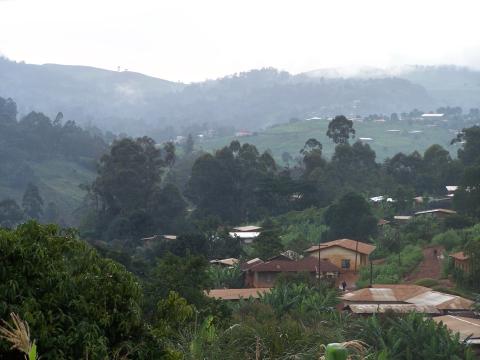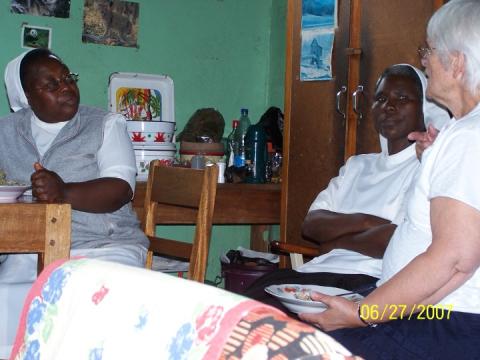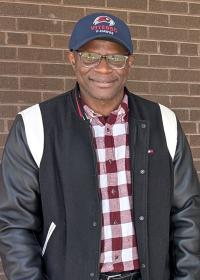In the remote villages of Cameroon in West Africa, access to health care can mean the difference between life and death. Primary Health Centers (PHCs) in Cameroon serve as lifelines for underserved areas like Shisong, a small but vital town nestled in the Northwest region of the country. These facilities offer maternal care, vaccinations, and treatment for diseases such as malaria and tuberculosis, ensuring health care remains within reach for the most vulnerable populations. However, PHCs in Cameroon face persistent challenges—staff shortages, medication supply issues, and financial instability—that threaten their survival.
In 1999, Viterbo nursing professor Patricia Zander, assistant dean of the RN to BSN program, was sent to Shisong to assess the curriculum of the Tertiary Franciscan Sisters’ nursing school. Shortly after her arrival, she was called into the office of the chief nursing officer at the local PHC, where she was also greeted by the Mother General of the Tertiary Sisters. Initially fearing she had made a mistake, Zander soon realized she had been summoned because they believed she could help address a serious problem.
The Cameroonian government categorized nurses at different levels, with brevité nurses at PHCs functioning similarly to licensed practical nurses (LPNs) in the U.S. This distinction created a significant disparity in care, and the government was using it as a justification to close the Franciscan Sisters' clinics. The Sisters, who had been providing critical health services, were desperate for a solution.
Rather than accepting the system’s limitations, Zander asked herself a pivotal question: What education could be provided to brevité nurses to elevate them to the government-recognized professional level? Drawing from her extensive experience at Viterbo, she proposed a strengthened curriculum incorporating community health, leadership management, theoretical nursing foundations, health assessment, and ethical aspects of health care. This wasn’t just an enhancement—it was a redefinition of what nursing education could be in Cameroon.
The curriculum was quickly developed and implemented, allowing brevité nurses to receive a certificate from Viterbo that elevated them to the professional nurse level recognized by the Cameroonian government. What began as a two-week trip to evaluate a nursing curriculum caused the evolution from a six week, three summer program into a long-term part of the Shisong Shool of Nursing’s curriculum. Zander and one of the FSPAs returned to Cameroon to teach the first session of the educational program, then continued as program director for the following two sessions. The journey was arduous, requiring cultural adaptation, resource management, and perseverance, but the results were undeniable. Zander was amazed to find out more than two decades later that the program continued to be part of Shishong School of Nursing’s curriculum. The program didn’t just elevate the status of nurses—it saved lives, improved hospital conditions, and ensured the continuation of vital health care services.
“The nurses enrolled in this program were seeing a wide variety of symptoms and medical issues,” reflected Zander. “PHCs didn’t always have doctors available, so it was essential that these nurses felt confident in their assessments and skills. Unlike most nurses in the U.S., they were suturing minor wounds, setting simple fractures, and delivering babies. The local population truly relied on these services. Right away, we saw that the curriculum was improving each student’s ability to assess patients, take action when needed, and communicate more effectively with doctors.”
Zander eventually returned her focus to Viterbo and the following year, a student named Frankline (Frankie) Fonyuy enrolled in the program in Cameroon. A talented soccer player, Fonyuy had recently suffered a knee injury that ended his athletic dreams. His father, who worked on the grounds of the Sisters’ convent, suggested that the nursing program might be a good fit for him. Fonyuy decided to pursue the opportunity in 2006 where he graduated with associates degree and eventually earned his Bachelor of Science in Nursing through Viterbo.
“I am so grateful for the program Dr. Zander created because she changed everything,” said Fonyuy. “I don’t think she will ever understand the full impact of her work. The program has grown and expanded so much, and most importantly, it has saved many lives by improving the quality of care in my country. And for me, it led to a career in nursing. This is more than a job to me—it is what I was born to do. Helping someone who is suffering or hurting is a humbling and wonderful experience.”
In 2017, Fonyuy was randomly selected in the United States Diversity Visa (DV) Lottery, a U.S. program granting green cards to individuals from countries with historically low immigration to the U.S. He had a friend in Rochester, Minn., and decided to take the opportunity. He spent his first few years in the States working at Walmart, an experience he credits with helping him acclimate to the culture and meet a diverse range of people. Eventually, he secured a nursing position at Mayo Clinic after obtaining BSN degree and chose to pursue his Doctor of Nursing Practice (DNP) degree at Viterbo University, which he considers the parent institution to the one that first made him a nurse.
What Fonyuy didn’t realize was that the woman who had unknowingly set his career in motion and changed health care in his country was still working at Viterbo and had been assigned as his project advisor.
Preferring face-to-face interactions, Fonyuy scheduled a meeting with his new advisor to ensure he fully understood the expectations of his project. As he and Zander began talking when he arrived for the meeting, she started asking about his life in Cameroon. He was surprised at her deep knowledge of his homeland, and soon the pieces fell together: the woman standing in front of him was the very person whose work had changed his life and improved health care in his country.
“I believe everything happens for a reason, and I was so overwhelmed when I realized who she was,” Fonyuy said. “It was incredible. She has had such an amazing impact on my life and my country, and there she was, standing right in front of me.”
The meeting was a full-circle moment—a testament to the deep, rippling effect of one person’s dedication. Zander’s impact extends far beyond the classroom. Her willingness to take on a challenge, her belief in the power of education, and her commitment to elevating nursing standards have left a lasting legacy. The program she built in Cameroon is more than a curriculum—it is a movement. One that continues to empower nurses, save lives, and transform communities.


